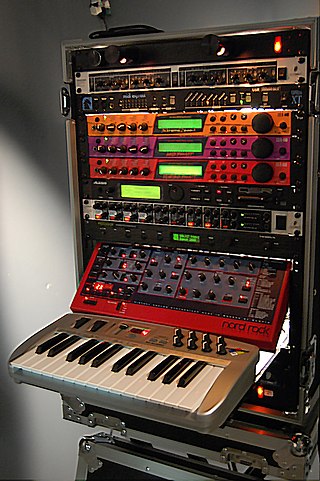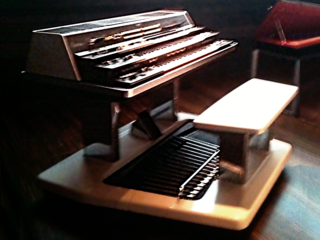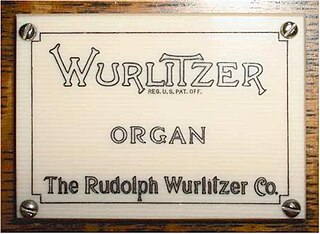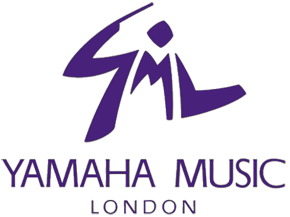
A digital synthesizer is a synthesizer that uses digital signal processing (DSP) techniques to make musical sounds, in contrast to older analog synthesizers, which produce music using analog electronics, and samplers, which play back digital recordings of acoustic, electric, or electronic instruments. Some digital synthesizers emulate analog synthesizers, while others include sampling capability in addition to digital synthesis.

An electronic musical instrument or electrophone is a musical instrument that produces sound using electronic circuitry. Such an instrument sounds by outputting an electrical, electronic or digital audio signal that ultimately is plugged into a power amplifier which drives a loudspeaker, creating the sound heard by the performer and listener.

MIDI is a technical standard that describes a communication protocol, digital interface, and electrical connectors that connect a wide variety of electronic musical instruments, computers, and related audio devices for playing, editing, and recording music.

In music, the organ is a keyboard instrument of one or more pipe divisions or other means for producing tones. The organs have usually two or three, up to five, manuals for playing with the hands and a pedalboard for playing with the feet. With the use of registers, several groups of pipes can be connected to one manual.

A digital piano is a type of electronic keyboard instrument designed to serve primarily as an alternative to the traditional acoustic piano, both in how it feels to play and in the sound it produces. Digital pianos use either synthesized emulation or recorded samples of an acoustic piano, which are played through one or more internal loudspeakers. They also incorporate weighted keys, which recreate the feel of an acoustic piano. Some digital pianos are designed to also look like an upright or grand piano. Others may be very simple, without a stand.

An electric piano is a musical instrument that has a piano-style musical keyboard, where sound is produced by means of mechanical hammers striking metal strings or reeds or wire tines, which leads to vibrations which are then converted into electrical signals by pickups. The pickups are connected to an instrument amplifier and loudspeaker to reinforce the sound sufficiently for the performer and audience to hear. Unlike a synthesizer, the electric piano is not an electronic instrument. Instead, it is an electro-mechanical instrument. Some early electric pianos used lengths of wire to produce the tone, like a traditional piano. Smaller electric pianos used short slivers of steel to produce the tone. The earliest electric pianos were invented in the late 1920s; the 1929 Neo-Bechstein electric grand piano was among the first. Probably the earliest stringless model was Lloyd Loar's Vivi-Tone Clavier. A few other noteworthy producers of electric pianos include Baldwin Piano and Organ Company, and the Wurlitzer Company.

Yamaha Corporation is a Japanese musical instrument and audio equipment manufacturer.

A sampler is an electronic musical instrument that records and plays back samples. Samples may comprise elements such as rhythm, melody, speech, sound effects or longer portions of music.

An electronic keyboard, portable keyboard, or digital keyboard is an electronic musical instrument based on keyboard instruments. Electronic keyboards include synthesizers, digital pianos, stage pianos, electronic organs and digital audio workstations. In technical terms, an electronic keyboard is a rompler-based synthesizer with a low-wattage power amplifier and small loudspeakers.
Kawai Musical Instruments Manufacturing Co., Ltd. is a musical instrument manufacturing company headquartered in Hamamatsu, Shizuoka, Japan. It is best known for its grand pianos, upright pianos, digital pianos, electronic keyboards and electronic synthesizers. The company was founded in August 1927.

A keytar is a keyboard instrument similar to a synthesizer or MIDI controller that is supported by a strap around the neck and shoulders, similar to the way a guitar is held.

An electric organ, also known as electronic organ, is an electronic keyboard instrument which was derived from the harmonium, pipe organ and theatre organ. Originally designed to imitate their sound, or orchestral sounds, it has since developed into several types of instruments:

The Rudolph Wurlitzer Company, usually referred to as simply Wurlitzer, is an American company started in Cincinnati in 1853 by German immigrant (Franz) Rudolph Wurlitzer. The company initially imported stringed, woodwind and brass instruments from Germany for resale in the United States. Wurlitzer enjoyed initial success, largely due to defense contracts to provide musical instruments to the U.S. military. In 1880, the company began manufacturing pianos and eventually relocated to North Tonawanda, New York. It quickly expanded to make band organs, orchestrions, player pianos and pipe or theatre organs popular in theatres during the days of silent movies.
HDC YoungChang is a South Korean manufacturer of pianos and industrial wood working machinery, headquartered in Incheon, South Korea. Young Chang currently holds 50% of the South Korean piano market. The company is among the largest and most automated of the world's piano manufacturers.

Bass pedals are an electronic musical instrument with a foot-operated pedal keyboard with a range of one or more octaves. The earliest bass pedals from the 1970s consisted of a pedalboard and analog synthesizer tone generation circuitry packaged together as a unit. The bass pedals are plugged into a bass amplifier or PA system so that their sound can be heard. Since the 1990s, bass pedals are usually MIDI controllers, which have to be connected to a MIDI-compatible computer, electronic synthesizer keyboard, or synth module to produce musical tones. Some 2010s-era bass pedals have both an onboard synth module and a MIDI output.

Crumar is an Italian manufacturer of electronic musical instruments. It was established by Mario Crucianelli in the late 1960s, and manufactured synthesizers and keyboards during the '70s and '80s. Its name is a portmanteau of "Crucianelli" and the name of his business partner, Marchetti. The company appears to have grown out of the Crucianelli accordion company and also continued to manufacture accordions under both names.
A music store or musical instrument store is a retail business that sells musical instruments and related equipment and accessories. Some music stores sell additional services, such as music lessons, music instrument or equipment rental, or repair services.
Viscount International SpA (Viscount) is a musical instrument manufacturer based in Mondaino, Italy. The brand Viscount was registered in 1969 by Marcello Galanti, but the company was established in the late 19th century by his forefather Antonio Galanti. After 1969 Viscount's primary focus has been on classic organs and digital pianos. Several alternative brands were formed in the 2000s to aim at expanding into other markets: VERSE and Voice Systems, respectively, for the high and low-end Pro-Audio markets and Physis for digital organs using Viscount's physical modeling technology. The company also used the Oberheim brand for several years, to market vintage organs, synthesizers and guitar effects. Currently, Viscount's manufacturing and R&D activity is based in Italy. The company has been continuously owned by the Galanti family since its inception.

Yamaha Music London is an English musical instrument and sheet music retail store owned and operated by Yamaha Music Europe GmbH's UK branch. It is located on Soho's Wardour Street, and the majority of the building has Grade II Listed status.

Electric music technology refers to musical instruments and recording devices that use electrical circuits, which are often combined with mechanical technologies. Examples of electric musical instruments include the electro-mechanical electric piano, the electric guitar, the electro-mechanical Hammond organ and the electric bass. All of these electric instruments do not produce a sound that is audible by the performer or audience in a performance setting unless they are connected to instrument amplifiers and loudspeaker cabinets, which made them sound loud enough for performers and the audience to hear. Amplifiers and loudspeakers are separate from the instrument in the case of the electric guitar, electric bass and some electric organs and most electric pianos. Some electric organs and electric pianos include the amplifier and speaker cabinet within the main housing for the instrument.



















